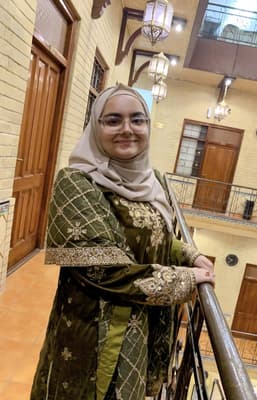April is Arab American Heritage Month, during which we honor the significant achievements, deep-rooted history, and invaluable contributions of Arab Americans to the United States. In celebration of Arab American Heritage Month, the CLS Program connected with two alumni, Wajahat Mohiuddin and Mehreen Shadid, to ask them what Arab American Heritage Month means to them, how their heritage impacted their Arabic language journey, and what they wish more Americans knew about Arabic language and culture.
Wajahat Mohiuddin

CLS Arabic 2023
Wajahat is an alumnus of the 2023 CLS Arabic Program hosted by the Noor Majan Arabic Institute in Nizwa, Oman. He graduated from the University of Houston with dual degrees in World Cultures & Literature and Human Resources Management and Services. He hopes to use his Arabic skills to work for a global organization in an Arabic-speaking country.
How did your background and heritage influence your language learning experience?
Being born and raised in Saudi Arabia was one of the inspirations behind me wanting to learn Arabic, and being a Muslim was another big part in my language learning journey as Arabic would allow me to understand the Qur'an and other religious texts originally written in Arabic without the need to rely on translations. I initially struggled with defining my identity as a third culture kid when we immigrated to the US and people asked where I was from, and this question has always been complicated for me since I am not ethnically Saudi, but that was the only place that I had ever called home, and the only culture that I was most familiar with. I also discovered that my great-grandparents from both sides of my family hailed from Iraq, so I realized that no matter how I define myself, Arabic would always be a part of my identity and this kept my motivation levels up in my Arabic learning journey as Arabic has also allowed me to more deeply reconnect with my heritage.
What is one aspect of Arab culture/custom or tradition you'd like for more people to know about?
People might already know about Arab hospitality and generosity but I would like to add on to this by mentioning that Arabs will invite anyone to come to their house to have tea/coffee and/or a meal with them regardless of the fact that it might be their first time meeting them, or it could even just be a chance encounter on the street. I personally experienced this on my study abroad in Amman, Jordan and during my CLS Program in Nizwa, Oman. In Nizwa, the night before the end of the CLS Program, there were actually 3-4 people outside the mosque after Isha (night) prayer arguing over whose house I should go to as they had all invited me. The imam of the mosque then overruled all of them and said that I would go to his house since he is the imam of the mosque.
What does celebrating Arab American Heritage Month mean to you?
Arabs have been present in the U.S. since before the Revolutionary War and they also served in the Continental Army, so I am pleased to see that Arab Americans are being recognized and honored. For me, this month is about recognizing and honoring the contributions of Arab Americans to various facets of American life, including art, literature, science, business, politics, and more, and that it is an opportunity to promote understanding, combat stereotypes and discrimination, and foster unity while embracing the unique heritage and experiences of Arab Americans.
Mehreen Shahid

CLS Arabic 2023
Mehreen is an alumna of the 2023 CLS Arabic Program hosted by the Arab American Language Institute in Morocco in Meknes, Morocco. She is currently a junior at Carleton College studying Biological Sciences and minoring in Arabic. She is especially interested in the intersection of STEM, language learning, and law.
How did your background and heritage influence your language learning experience?
Growing up, every evening after my secular education, I would head to the madrassa at my local mosque where I would learn Islamic history, jurisprudence, and theology. Part of my Islamic education involved learning to read the Holy Quran, which is in classical Arabic. I struggled with this because reading with perfect pronunciation but without understanding the message made no sense to me. While reading English Translations of the Quran, I always felt like I was missing something, so in college, I decided to learn Arabic. I strengthened my ties to my religion but also gained a unique skill that complemented my multilingual background. The most fascinating aspect of my Arabic language learning journey was that along with Arabic, I expanded my understanding of Urdu, my mother tongue, and Swahili, the national language of Tanzania where I lived for many years. Urdu has words from the Persian lexicon which has words of Arab origin, and Swahili is a mix of Bantu languages and Arabic. I was able to compare and analyze vocabulary in the three languages in the context of world history, linguistics, and cultural practices. I developed metalinguistic awareness by drawing connections between the languages I knew!
What is one aspect of Arab culture/custom or tradition you'd like for more people to know about?
Many times, as non-Arabs, we tend to think of Arabic-speaking countries as the same because of their geography, religious makeup, and their shared use of Modern Standard Arabic in formal settings. However, that is not entirely true, and during my time in Morocco, I learned that just like each Arab country has its distinctive dialect of Arabic, they each have a unique way of commemorating events. One such example is Ashura which is a Muslim holy day observed on the 10th of Muharram, the first month of the lunar Islamic calendar. In some parts of the Arab World, Ashura is a day of grief and mourning where people commemorate the martyrdom of Husayn ibn Ali, the grandson of the Holy Prophet Muhammed. In other Arab countries, such as Morocco, people engage in cheerful activities such as lighting bonfires, baking traditional sweets, and women adorning their hands and feet with green henna. They celebrate Ashura as the day that God parted the Red Sea for Moses and his followers to escape persecution from the Pharoah. This goes to show how the same holy day, Ashura, is commemorated completely differently in distinct parts of the Arab world.
What does celebrating Arab American Heritage Month mean to you?
To celebrate Arab American Heritage Month is to learn the history of the Arab diaspora in the US, the challenges Arab Americans face as Americans who, like most diasporas in the US, have strong ties to their native lands and culture, and how US foreign policy in the Middle East impacts their identity as Arab Americans. Additionally, it is the time to appreciate Arab Americans in your local community for their contributions to society. My Arab American friends often say that celebrating Arab American Heritage Month is not just for those who identify as Arab Americans, but also for those who see themselves as an ally of the community. This is the month to appreciate Arab culture! I like to take a trip to my favorite local Arab-owned restaurant and try something new. This April, I went to an Egyptian-owned restaurant and tried macaroni bechamel which is penne pasta baked with bechamel sauce and ground beef. Especially during this month, I try to watch films that are made by Arab, Southwest Asian, and North African makers. I highly recommend Mediterranean Fevera dark comedy by Palestinian filmmaker Maha Haj and the film Amreeka which beautifully captures the experience of a Palestinian family immigrating to the suburbs of Chicago post 9/11.


